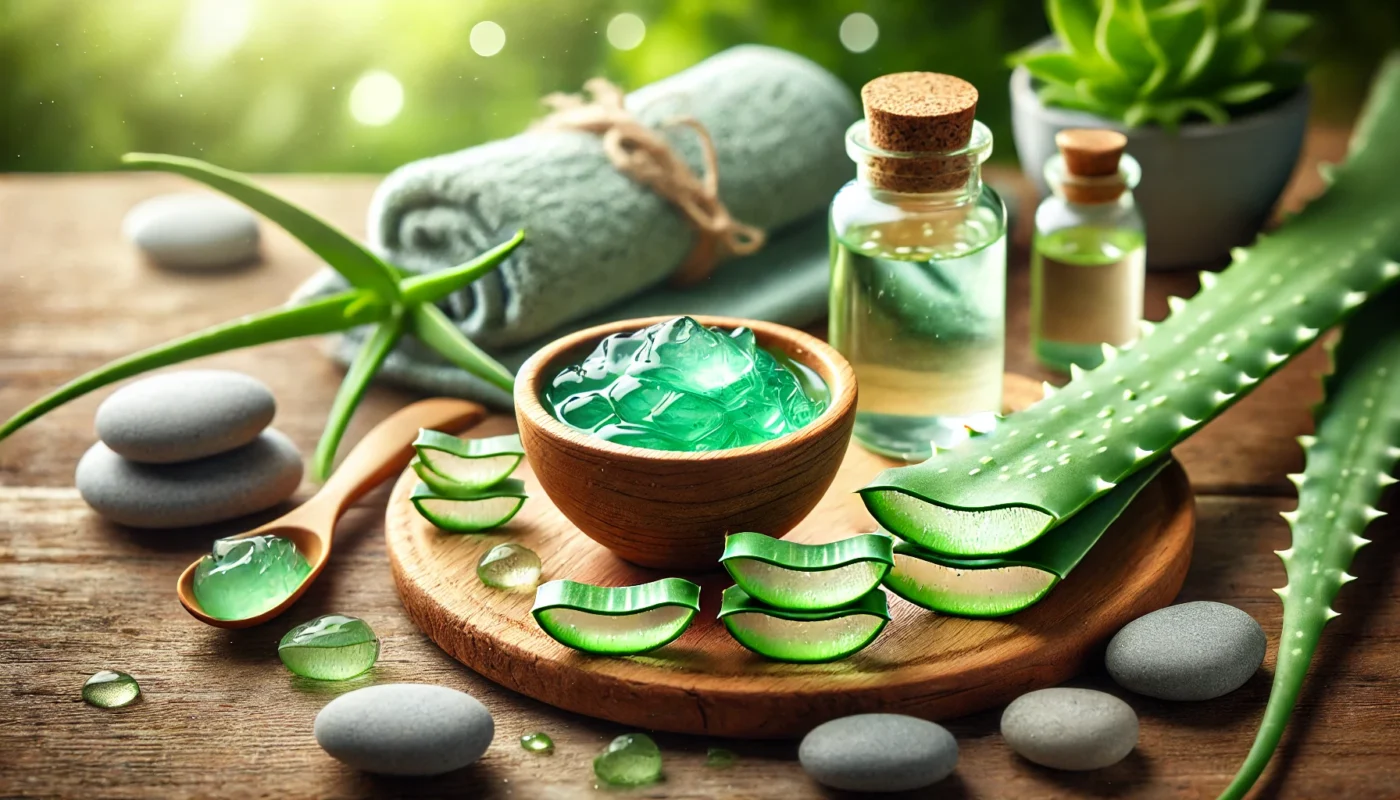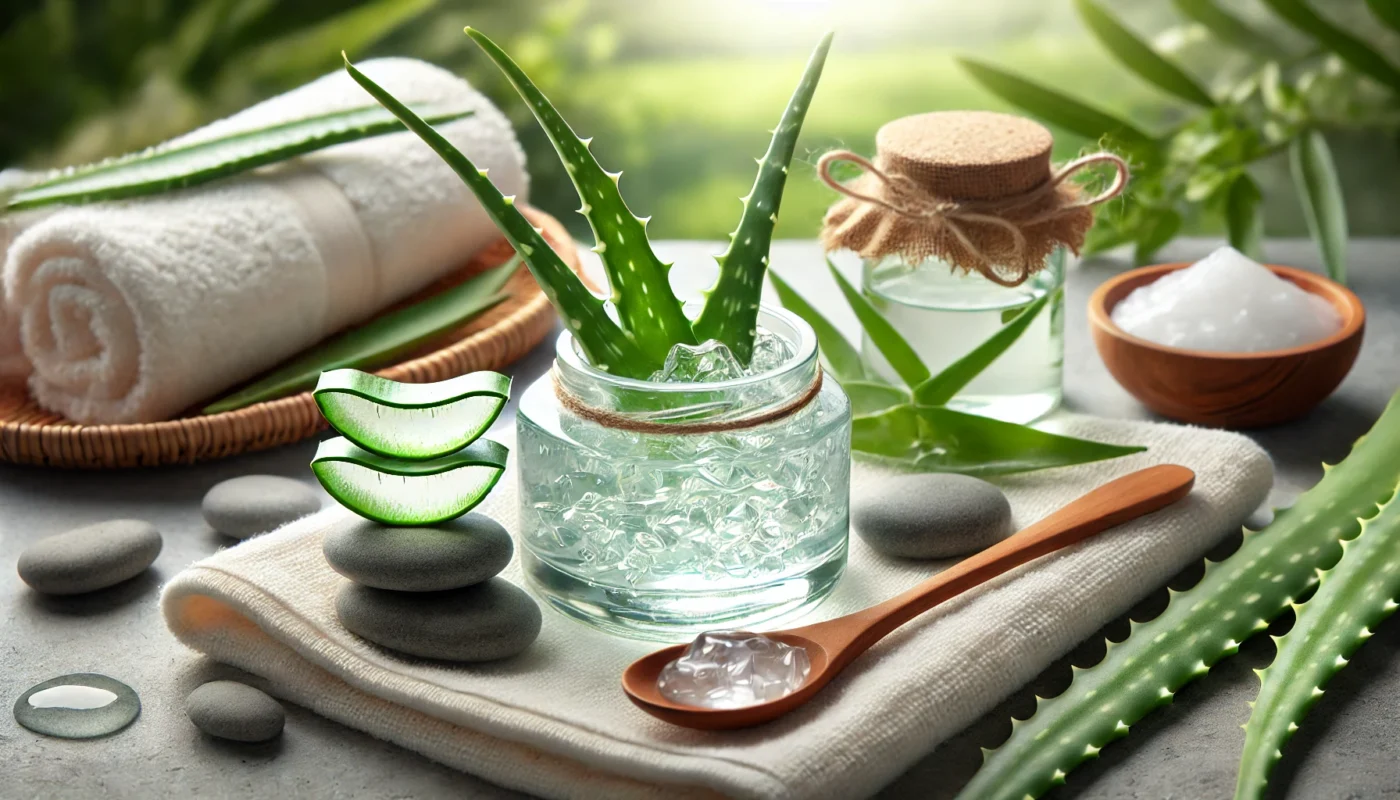Aloe vera, often dubbed the “plant of immortality,” has been revered for its health benefits for centuries. This remarkable plant has fascinated cultures worldwide, from ancient Egyptians to modern-day wellness enthusiasts. Its applications in holistic health practices have made it a staple in many households. But what is the science behind its purported benefits? How does aloe vera work, and what makes it so unique? In this article, we will delve into the scientific research behind aloe vera, exploring its antibacterial properties, diverse uses, and overall benefits.
You may also like: Home Remedies: Fight Cut Infections Naturally
Understanding Aloe Vera
Aloe vera is a succulent plant species of the genus Aloe. Its thick, fleshy leaves contain a gel-like substance that is commonly used in various health and beauty products. Rich in vitamins, minerals, and amino acids, aloe vera is celebrated for its soothing and healing properties. But beyond anecdotal claims, what does science say about this plant?
Botanical Characteristics
Aloe vera is characterized by its hardy, fleshy leaves that store water, allowing it to thrive in arid climates. Its ability to survive in harsh conditions is due to its unique water retention properties. The plant’s structure is designed to minimize water loss, making it an efficient survivor in drought-prone environments. This resilience is partly why aloe vera has been used medicinally for thousands of years.
Nutritional Composition
The gel inside aloe vera leaves is rich in nutrients, including vitamins A, C, E, and B12, as well as minerals like calcium, magnesium, and zinc. These nutrients contribute to its health-promoting properties. Aloe vera also contains essential amino acids that are crucial for various bodily functions, enhancing its role as a natural supplement.
Historical Significance
Aloe vera has a storied history, with records of its use dating back to ancient civilizations. The Egyptians referred to it as the “plant of immortality” and used it in burial rituals. The Greeks and Romans also valued its healing properties, and it became a staple in traditional medicine systems across the world. This historical context highlights aloe vera’s enduring appeal and the trust placed in its benefits over the centuries.
Is Aloe Vera Antibacterial?
One of the critical questions surrounding aloe vera is its antibacterial properties. Is aloe vera antibacterial, and if so, how effective is it?
Scientific Evidence
Research suggests that aloe vera does possess antibacterial properties, thanks to its rich composition of bioactive compounds. A study published in the “Journal of Pharmacognosy and Phytochemistry” found that aloe vera gel exhibited significant antibacterial activity against a range of bacteria, including Staphylococcus aureus and Escherichia coli. These properties are attributed to compounds such as anthraquinones, which are known for their antimicrobial effects.
Mechanism of Action
The antibacterial effects of aloe vera are largely due to its bioactive compounds, which disrupt bacterial cell walls and inhibit their growth. These compounds include anthraquinones, saponins, and salicylic acid, all of which contribute to its antimicrobial activity. This mechanism is why aloe vera is often used in topical applications to prevent infections in minor cuts and wounds.
Comparative Effectiveness
While aloe vera shows promise as a natural antibacterial agent, it is essential to understand that its effectiveness can vary depending on the concentration and preparation of the gel. Studies have shown that pure, concentrated aloe vera gel is more effective than diluted forms. Therefore, while it may aid in minor skin infections, it should not replace conventional medical treatments for severe infections.

Aloe Vera Benefits
Aloe vera’s benefits extend beyond its antibacterial properties. Let’s explore some of the key health benefits associated with this versatile plant.
Skin Health
Aloe vera is widely used in skincare products for its soothing and moisturizing effects. It helps to alleviate sunburn, reduce acne, and hydrate the skin. A study in the “Journal of Dermatological Treatment” highlighted that aloe vera gel could improve the skin’s ability to retain moisture, making it an excellent choice for individuals with dry or sensitive skin.
Sunburn Relief
Aloe vera is renowned for its ability to soothe sunburned skin. Its cooling effect provides immediate relief from the burning sensation, while its anti-inflammatory properties help reduce redness and swelling. Regular application can also prevent peeling and accelerate the healing process.
Acne Treatment
For those struggling with acne, aloe vera offers a natural remedy. Its antibacterial properties help reduce the presence of acne-causing bacteria on the skin. Additionally, its anti-inflammatory effects can diminish the appearance of blemishes and scars, promoting a clearer complexion.
Anti-Aging Benefits
Aloe vera’s rich nutrient profile supports skin elasticity and firmness, making it a popular ingredient in anti-aging products. The vitamins and antioxidants in aloe vera help combat free radicals, reducing the appearance of fine lines and wrinkles. Regular use can result in healthier, more youthful-looking skin.
Digestive Health
Aloe vera is also known for its positive impact on digestive health. The gel contains enzymes that aid in breaking down sugars and fats, promoting better digestion. Additionally, its laxative properties can help alleviate constipation. However, it’s crucial to consume aloe vera juice in moderation, as excessive intake can lead to adverse effects.
Digestive Enzymes
Aloe vera contains enzymes like amylase and lipase, which assist in breaking down carbohydrates and fats, respectively. These enzymes enhance nutrient absorption and improve overall digestive efficiency. Incorporating aloe vera juice into your diet can support a healthy digestive system.
Constipation Relief
Aloe vera’s natural laxative properties make it effective in relieving constipation. It works by increasing intestinal water content and stimulating peristalsis, the movement of the intestines that propels waste through the digestive tract. However, it’s important to use aloe vera juice sparingly to avoid potential side effects.
Gut Health
The prebiotic properties of aloe vera support the growth of healthy gut bacteria, promoting a balanced microbiome. A healthy gut microbiome is essential for optimal digestion, nutrient absorption, and immune function. Regular consumption of aloe vera juice can contribute to maintaining a healthy gut environment.
Immune System Support
The immune-boosting properties of aloe vera are linked to its high content of antioxidants, vitamins, and minerals. These nutrients help to strengthen the immune system, enhancing the body’s ability to ward off infections and illnesses.
Antioxidant Protection
Aloe vera is rich in antioxidants, which help protect the body from oxidative stress and free radical damage. These antioxidants, including vitamins C and E, bolster the immune system by neutralizing harmful substances that can weaken immune defenses.
Vitamin and Mineral Support
Aloe vera provides essential vitamins and minerals that support immune health. Vitamins A, C, and E, along with minerals like zinc and selenium, play crucial roles in maintaining a robust immune system. These nutrients enhance the body’s ability to fight infections and promote overall wellness.
Anti-Inflammatory Effects
Chronic inflammation can weaken the immune system and lead to various health issues. Aloe vera’s anti-inflammatory properties help reduce inflammation, supporting a healthy immune response. Regular use of aloe vera can contribute to maintaining a balanced immune system.
Wound Healing
Aloe vera has been extensively studied for its wound-healing capabilities. The gel accelerates the healing process by increasing blood circulation to the area and preventing infection. A clinical trial published in the “Journal of Ethnopharmacology” demonstrated that aloe vera gel could significantly reduce the healing time of burn wounds compared to conventional treatments.
Enhanced Blood Circulation
Aloe vera promotes increased blood flow to the site of injury, delivering essential nutrients and oxygen that facilitate healing. This enhanced circulation accelerates the repair of damaged tissues, reducing recovery time and minimizing scarring.
Infection Prevention
The antibacterial properties of aloe vera help prevent infections in wounds, cuts, and burns. By creating a protective barrier, aloe vera gel reduces the risk of bacterial contamination and supports the body’s natural healing process.
Scar Reduction
Regular application of aloe vera gel can reduce the appearance of scars by promoting the regeneration of healthy skin cells. Its moisturizing properties also prevent excessive dryness and peeling, contributing to smoother, more even skin texture.

Aloe Vera Uses
Aloe vera’s versatility makes it a valuable addition to various health and wellness routines. Here are some practical uses for this plant:
Topical Applications
Aloe vera gel can be applied directly to the skin to soothe burns, cuts, and insect bites. Its cooling effect provides immediate relief, while its antibacterial properties help to prevent infection. For best results, opt for pure aloe vera gel or products with a high concentration of aloe vera.
Soothing Burns and Cuts
Aloe vera’s natural cooling properties make it ideal for soothing burns and cuts. Its application provides quick relief from pain and reduces inflammation, promoting faster healing. The gel’s antibacterial action also prevents infections in open wounds.
Insect Bite Relief
For insect bites, aloe vera offers a natural remedy to reduce itching and swelling. Its anti-inflammatory effects help alleviate discomfort, while its antibacterial properties minimize the risk of secondary infections. Applying aloe vera gel to affected areas can provide immediate relief.
Eczema and Psoriasis
Aloe vera’s soothing properties make it beneficial for managing skin conditions like eczema and psoriasis. Its anti-inflammatory effects reduce redness and irritation, while its moisturizing properties help maintain skin hydration. Regular use can improve skin condition and reduce flare-ups.
Dietary Supplements
Aloe vera juice and supplements are available for those looking to support their digestive health or boost their immune system. However, it’s essential to choose reputable brands and consult with a healthcare professional before incorporating aloe vera supplements into your routine.
Choosing Quality Products
When selecting aloe vera supplements, it’s crucial to choose products from reputable brands that prioritize quality and purity. Look for certifications and third-party testing to ensure the product’s safety and efficacy. Quality supplements can provide the intended health benefits without adverse effects.
Dosage and Safety
Understanding the appropriate dosage is essential when using aloe vera supplements. Overconsumption can lead to digestive issues and other side effects. It’s important to follow recommended dosages and consult with a healthcare professional, especially if you have underlying health conditions or are taking medications.
Complementary Health Benefits
Incorporating aloe vera supplements into your routine can complement other health practices, such as a balanced diet and regular exercise. Its digestive and immune-boosting properties can enhance overall well-being, contributing to a healthier lifestyle.
Hair Care
Aloe vera is not just beneficial for the skin; it can also improve hair health. Its moisturizing properties help to reduce dandruff and promote a healthy scalp. Applying aloe vera gel to the scalp can soothe irritation and add shine to the hair.
Dandruff Reduction
Aloe vera’s moisturizing and anti-inflammatory properties make it effective in reducing dandruff. It hydrates the scalp, alleviating dryness and flakiness. Regular use can promote a healthier scalp environment and minimize dandruff-related discomfort.
Scalp Irritation Relief
For those with sensitive scalps, aloe vera offers a natural solution to soothe irritation and itchiness. Its cooling effect provides immediate relief, while its nourishing properties support scalp health. Aloe vera can be used as a pre-shampoo treatment for optimal results.
Hair Shine and Strength
Aloe vera enhances hair shine and strength by providing essential nutrients and moisture. Its application can improve hair texture, making it smoother and more manageable. Aloe vera’s natural conditioning properties contribute to healthier, more vibrant hair.

Safety and Precautions
While aloe vera is generally safe for topical and oral use, there are some precautions to keep in mind. Some individuals may experience allergic reactions, particularly if they have a history of allergies to plants in the Liliaceae family. Additionally, overconsumption of aloe vera juice can lead to digestive issues, so it’s essential to adhere to recommended dosages.
Allergic Reactions
Individuals with allergies to plants in the Liliaceae family, such as garlic and onions, may experience allergic reactions to aloe vera. Symptoms can include skin irritation, redness, and itching. It is advisable to perform a patch test before using aloe vera products extensively.
Digestive Concerns
Excessive consumption of aloe vera juice can lead to digestive issues, such as diarrhea and abdominal cramps. These effects are primarily due to the plant’s laxative properties. To avoid adverse effects, it is essential to follow recommended dosages and consult a healthcare professional if needed.
Interactions with Medications
Aloe vera may interact with certain medications, affecting their efficacy or causing unwanted side effects. Individuals taking prescription medications should consult with their healthcare provider before using aloe vera supplements. This precaution ensures safe and effective use of aloe vera alongside other treatments.
Conclusion
Aloe vera’s benefits are backed by scientific research, making it a valuable addition to any health and wellness routine. Its antibacterial properties, skin and digestive health benefits, and immune system support make it a versatile and natural remedy. However, as with any natural treatment, it’s essential to use aloe vera responsibly and consult with healthcare professionals when necessary. Whether you’re a fitness enthusiast, health enthusiast, or medical patient, aloe vera offers a range of benefits that can enhance your overall wellbeing.
Informed Decisions
By understanding the science behind aloe vera and its uses, you can make informed decisions about incorporating this remarkable plant into your health regimen. Awareness of its benefits and potential risks allows you to utilize aloe vera effectively and safely. Embrace the power of aloe vera and unlock its potential to improve your health and vitality.
Future Research
While aloe vera has proven benefits, ongoing research continues to explore its full potential. Future studies may uncover new applications and enhance our understanding of its mechanisms. Staying informed about the latest scientific findings can help you make the most of aloe vera’s health benefits.
A Holistic Approach
Incorporating aloe vera into your health and wellness routine can complement a holistic approach to well-being. Combined with a balanced diet, regular exercise, and mindfulness practices, aloe vera can contribute to a healthier, more fulfilling lifestyle. Embrace its versatility and enjoy the array of benefits it offers.
Further Reading:
Antibacterial properties of Aloe vera gel-finished cotton fabric
Antibacterial activities and antioxidant capacity of Aloe vera
insect bites, aloe vera, eczema, psoriasis, dietary supplements, hair care, dandruff reduction, scalp irritation, health benefits, safety precautions, allergic reactions, digestive health, immune support, holistic wellness, natural remedies
Important Note: The information contained in this article is for general informational purposes only, and should not be construed as health or medical advice, nor is it intended to diagnose, prevent, treat, or cure any disease or health condition. Before embarking on any diet, fitness regimen, or program of nutritional supplementation, it is advisable to consult your healthcare professional in order to determine its safety and probable efficacy in terms of your individual state of health.
Regarding Nutritional Supplements Or Other Non-Prescription Health Products: If any nutritional supplements or other non-prescription health products are mentioned in the foregoing article, any claims or statements made about them have not been evaluated by the U.S. Food and Drug Administration, and such nutritional supplements or other health products are not intended to diagnose, treat, cure, or prevent any disease.

